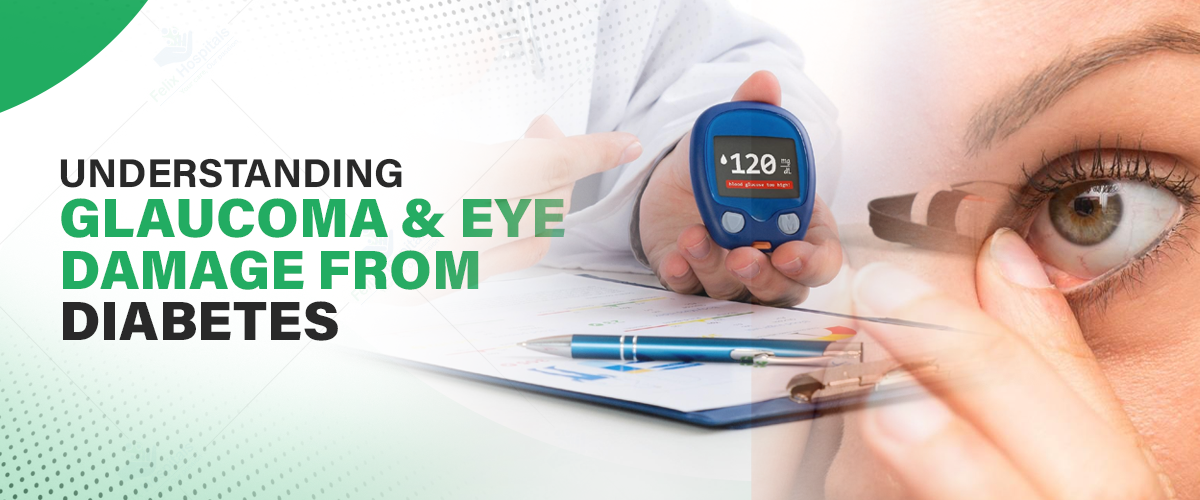
Subscribe to our

Glaucoma and diabetes are two serious health conditions that can significantly impact vision and overall quality of life. Glaucoma is an eye disease that damages the optic nerve, often due to increased eye pressure, leading to vision loss if left untreated. Diabetes, a chronic condition affecting blood sugar levels, increases the risk of developing glaucoma.
People with diabetes are at a higher risk of developing diabetic glaucoma symptoms due to elevated blood sugar levels, which can lead to increased eye pressure and optic nerve damage. If you are seeking the Best hospital for glaucoma diabetes treatment, choosing a facility with expert ophthalmologists and advanced diagnostic tools is essential for early detection and effective management.
Book an appointment with the best ophthalmologists today for expert diagnosis and treatment. Call Now at +91 9667064100.
Glaucoma is a group of eye diseases that cause damage to the optic nerve, leading to vision loss. The primary types of glaucoma include:
Glaucoma can result in blindness if left untreated, making early diagnosis crucial. While age and genetics play a role, diabetes significantly increases the risk of developing this condition.
Diabetes affects various organs in the body, including the eyes. Here’s how it contributes to glaucoma:
Many people do not experience symptoms of glaucoma until significant vision loss occurs. Common diabetic glaucoma symptoms include:
Regular eye check-ups are essential for diabetics, as early detection of glaucoma can prevent severe vision loss.
Diagnosing glaucoma involves a series of specialized eye tests, including:
Annual eye check-ups are crucial for diabetics to ensure early detection and timely intervention.
Managing glaucoma in diabetic patients requires a multi-faceted approach:
Lifestyle Modifications: Managing diabetes, maintaining a healthy diet, and avoiding stress are crucial in preventing further
complications.
Preventing glaucoma involves maintaining overall eye health and managing diabetes effectively:
Felix Hospital is home to some of the most experienced ophthalmologists, specializing in treating glaucoma and diabetes-related eye conditions:
Take control of your eye health today! Consult our glaucoma specialists by Scheduling your appointment for an advanced eye screening.
Glaucoma is a serious complication of diabetes that can lead to vision loss if not managed properly. Early detection and appropriate treatment are essential in preserving eye health. If you are looking for expert care, consider the glaucoma diabetes treatment cost in Noida and choose a reputed hospital with experienced specialists.
Prioritizing regular eye exams, managing blood sugar levels, and adopting a healthy lifestyle can significantly reduce the risk of developing glaucoma. Don’t wait for symptoms to appear—schedule an eye check-up today to protect your vision and overall well-being.
Q- Can diabetes-related glaucoma be reversed?
Ans- No, glaucoma-related damage to the optic nerve is irreversible. However, early detection and treatment can slow down progression and help preserve remaining vision.
Q- How often should diabetics get screened for glaucoma?
Ans- Diabetics should undergo a comprehensive eye exam at least once a year. Those with existing diabetic eye conditions may require more frequent monitoring.
Q- Does controlling blood sugar reduce the risk of glaucoma?
Ans- Yes! Proper diabetes management lowers intraocular pressure and reduces optic nerve damage, decreasing the chances of glaucoma development.
Q- What is the difference between diabetic retinopathy and diabetic glaucoma?
Ans- Diabetic retinopathy is caused by damaged blood vessels in the retina, while diabetic glaucoma results from increased eye pressure leading to optic nerve damage.
Q- Are there warning signs before vision loss occurs?
Ans- Unfortunately, glaucoma often has no early symptoms. By the time vision loss is noticeable, the disease is usually advanced. This is why regular screenings are vital.
Q- Can laser treatment cure diabetic glaucoma?
Ans- Laser treatments help reduce intraocular pressure, slowing the progression of glaucoma. However, they cannot restore lost vision—which is why early treatment is key.
Q- What are the best foods for diabetics to maintain eye health?
Ans- Foods rich in antioxidants, omega-3 fatty acids, and vitamin A—such as spinach, salmon, nuts, and carrots—support eye health and may help reduce glaucoma risk.